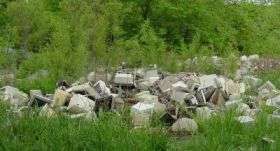New process may convert toxic computer waste into safe products

Discarded computer parts could one day wind up fueling your car. That’s because researchers in Romania and Turkey have developed a simple, efficient method for recycling printed circuit boards into environmentally-friendly raw materials for use in fuel, plastic, and other useful consumer products. Their study is scheduled for the May 21 issue of ACS’ Energy & Fuels.
The boom in the use of computers has also created one of the world’s biggest environmental headaches: What to do with all the discarded circuit boards, which contain high levels of pollutants such as heavy metals and flame retardants that can potentially harm humans?
Researchers are seeking ways to remove these toxins so that these scrap materials can be safely recycled.
In the new study, Cornelia Vasile and colleagues collected printed circuit boards from discarded computers and processed the boards with a combination of high temperatures, catalysts, and chemical filtration. The processing method removed almost all of the toxic substances from the scraps, resulting in oils that can be safely used as fuel or raw materials called feedstocks for a wide variety of consumer products, the researchers say.
Source: ACS
















